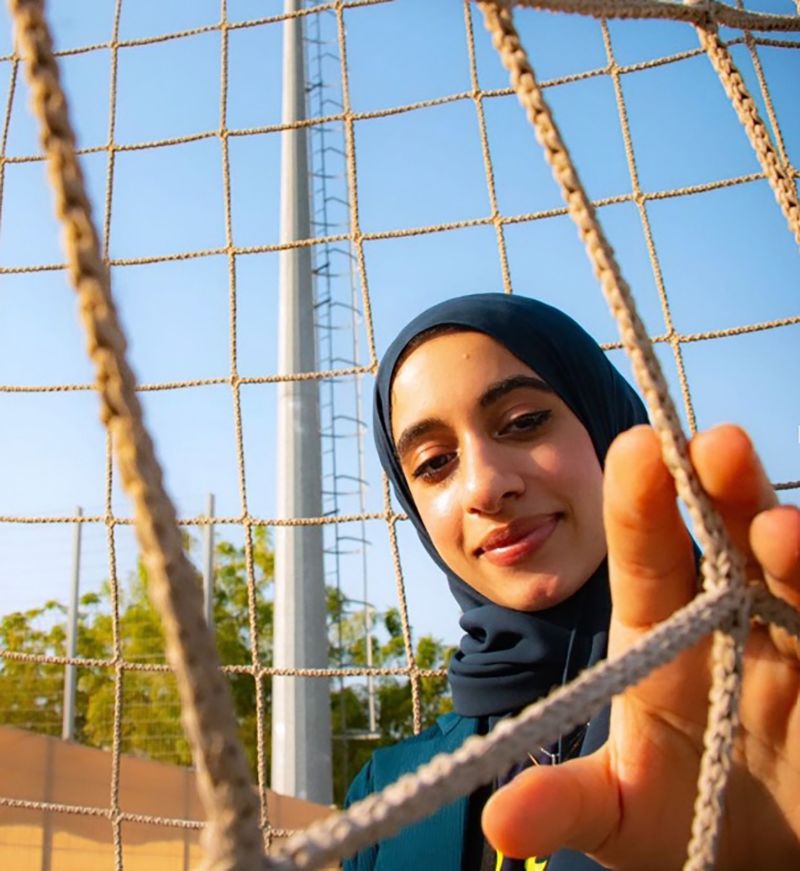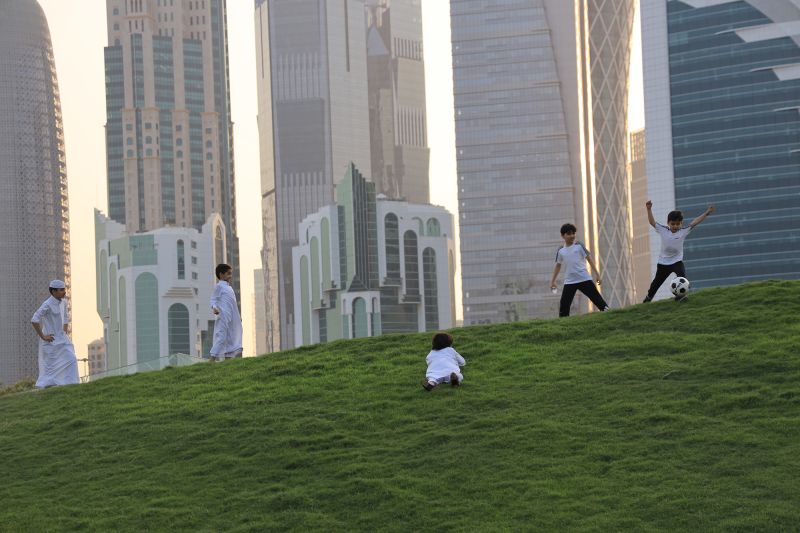
The Impact of Qatar 2022: Reflecting on a World Cup Unlike Any Other

A year on from Qatar 2022, witness the enduring legacy of a groundbreaking World Cup, leaving an indelible mark on sports and society, while recognizing the human cost and celebrating the unforgettable moments that captivated the world
The 2022 World Cup final will be remembered as an exhilarating, intense, and unforgettable game in the sport's history.
It marked the pinnacle of Lionel Messi's career on the soccer field, solidifying his status as the greatest player of his era by leading Argentina to victory in the World Cup.
The tournament ended with a perfect fairytale conclusion that thrilled over a billion fans worldwide. This satisfying ending, however, overshadowed the fact that it was the bookend to the most controversial World Cup in history. At the beginning of the tournament, the focus was on off-field issues such as workers' rights and the treatment of the LGBTQ+ community.
Moments before the start of the opening match, FIFA President Gianni Infantino delivered a passionate speech at a press conference in Doha, addressing hundreds of journalists. He condemned Western critics, accusing them of hypocrisy and racism.
"Reform and change require patience. It took centuries for our European countries to progress. It takes time everywhere, and the only way to achieve results is through constructive engagement, not through confrontation," stated Infantino.
The FIFA president assured the room of journalists that the organization will uphold its commitment to protecting the legacy for migrant workers in collaboration with the Qatar authorities. "I will return, we will be here to monitor, so don't worry, because you will not be forgotten," he declared.
So, a year on from the World Cup final, what is the legacy of the 2022 World Cup?
Human cost of hosting the World Cup
Human rights groups strongly criticized Qatar's decision to host the World Cup. According to a 2021 report by Amnesty International, Qatari authorities have failed to investigate "thousands" of deaths of migrant workers over the past decade, despite evidence linking these premature deaths to unsafe working conditions.
Photo Illustration: CNN/Adobe Stock
Our dreams remained unfulfilled. These individuals contributed to the construction of Qatar's World Cup, but now they are facing difficulty in simply surviving.
In 2019, The Guardian released a report stating that 6,500 migrant workers from South Asia had died in Qatar since the country was granted the World Cup in 2010. However, the report did not attribute all 6,500 deaths to World Cup construction projects and was not independently confirmed by CNN.
Hassan Al Thawadi, the individual responsible for overseeing Qatar's preparations, stated in an interview with CNN's Becky Anderson that the reported figure of 6,500 deaths related to the World Cup preparations was sensationalized and lacked context. He later informed Piers Morgan that the actual number of migrant worker deaths due to projects connected to the tournament is between 400 and 500, which is higher than the initial figure provided by Qatari officials.
He stated that three fatalities were directly related to the construction of World Cup stadiums, along with 37 non-work-related deaths.
The true toll of hosting the World Cup in a country that had to construct the majority of its infrastructure from the ground up, largely through the labor of migrants working in extreme summer temperatures, remains unknown.
The stadiums used in the tournament were truly remarkable. While some are now utilized for cultural and sporting events, others remain empty for extended periods. Despite this, did Qatar deliver on its promise of reform for workers?
Khalifa International Stadium —
The Khalifa International Stadium was the first of the Qatar 2022 World Cup venues to be completed.
Handout/Getty Images Europe/Getty Images for Qatar 2022
Khalifa International Stadium —
It officially opened on May 19, 2017, and can hold 48,000 fans after being expanded for the World Cup.
Handout/Getty Images Europe/Qatar 2022 via Getty Images
Khalifa International Stadium —
Initially opened in 1976, the stadium is situated close to Doha's impressive Aspire Zone and has undergone two reconstructions, first in 2005 and then in 2017.
Handout/Getty Images Europe
Al Wakrah Stadium —
An artist's rendering of the Al Wakrah stadium in Qatar.
Supreme Committe For Delivery and Legacy
Al Wakrah Stadium —
Located just outside of Doha, the Al-Wakrah Stadium, designed by Zaha Hadid Architects, will accommodate 40,000 spectators and will be the venue for games leading up to the World Cup quarterfinals. Courtesy of Zaha Hadid Architects.
Qatar Foundation Stadium —
The Qatar Foundation Stadium in Doha's Education City will have an initial capacity of 40,000.
Handout/Getty Images Europe/Supreme Committee for Delivery & Legacy via Getty Images
Qatar Foundation Stadium —
But that will be reduced to 20,000 after the tournament, with half the seats removed and donated to build stadiums in developing countries.
Supreme Committe For Delivery and Legacy
Al Bayt Stadium —
The Al Bayt Stadium will be built in the city of Al Khor to the north of Doha and have a capacity of 60,000.
Handout/Getty Images Europe/Supreme Committee for Delivery &
Al Bayt Stadium —
An artist's impression of the exterior of the Al Bayt Stadium.
Supreme Committe For Delivery and Legacy
Al Bayt Stadium —
The stadium design, which depicts a giant tent structure, honors Qatar's past and present, according to Qatar's Supreme Committee for Delivery and Legacy.
Neoscape
Al Thumama Stadium —
The Al Thumama Stadium, with a seating capacity of 40,000, will be the host of matches through the quarterfinals of the 2022 World Cup. The stadium's design is inspired by the gahfiya, a traditional woven cap worn by men in the Arab world.
Al Rayyan Stadium —
The Al Rayyan Stadium will be built on the site of the existing Ahmed Bin Ali Stadium in Al Rayyan just outside Doha.
Handout/Getty Images Europe/Supreme Committee for Delivery &
Al Rayyan Stadium —
An artists' impression of the Al Rayyan Stadium which will host matches up until the quarterfinal stage of the tournament.
Supreme Committe For Delivery and Legacy
The Lusail Iconic Stadium, located just outside Doha, is set to be the venue for the opening and closing matches of the 2022 World Cup. This stadium is also a focal point of the Lusail City project, which is expected to become the residence of over 200,000 individuals, as per the Qatar's Supreme Committee for Delivery and Legacy.
Getty Images
Take a tour of the Qatar 2022 World Cup stadiums
Prev
Next
Amnesty warned that a year after the tournament, the legacy for migrant workers in Qatar was at risk. In a report titled "A Legacy in Jeopardy," the human rights organization noted that the government's efforts for fair conditions and decent work had decreased after the media attention faded, despite the ongoing contribution of hundreds of thousands of workers to the country.
Amnesty admitted that there had been improvements on previous issues - workers can now leave the country and have more freedom to switch jobs, with the contentious kafala system no longer in place. Let's not forget the workers who made the 2022 World Cup a reality.
Amnesty International
However, the organization maintained that, despite FIFA and Qatars claims of progress, not enough has been done since the World Cup festival left town.
Amnesty has spoken with workers who claim that they still need permission to change jobs, and wage theft continues to be the most common form of exploitation.
"Let's not forget the workers who made the 2022 World Cup happen," Amnesty stated.
Qatar's International Media Office (IMO), established to accurately represent Qatar, stated to CNN that reforms were expedited by the World Cup, resulting in a significant and enduring legacy for the tournament.
The statement emphasized that the effort to enhance Qatar's labor system and protect workers' rights was not exclusively connected to the World Cup and was always intended to persist beyond the conclusion of the tournament.
Significant progress
"It has been a year since the World Cup, and Qatar's dedication to labor reform continues to be unwavering, as we aim to build a labor system that is globally renowned and draws individuals from around the globe to reside and work in Qatar."
FIFA has faced backlash since the announcement of Qatar as the tournament's host 13 years ago. In response, it established a World Cup Legacy Fund with a focus on children's education in developing countries and the creation of a labor excellence hub.
FIFA has reported that it has been collaborating with organizations like the International Labour Organization (ILO) to oversee improvements in workers' rights. In a statement to CNN, FIFA acknowledged that substantial progress has been made in the country and attributed these reforms to the tournament.
However, it acknowledged the need for further efforts to be made. "It is evident that implementing these significant changes will require time and increased dedication to ensure that all workers in the nation reap the benefits of the reforms," it stated.
The ILO published an updated report in November highlighting areas where workers rights have both improved and where they still need work.
There are so many memories
The World Cup created lasting memories for many locals, including resident Reem Al-Haddad who shared with CNN the significance of the event for her and fellow Qataris.
Al-Haddad's story was just one of the many included in the "GOALS" program, a collaborative initiative between The Sports Creative, Qatar Foundation, Generation Amazing, and Salam Stores. The program aimed to share the untold stories of the World Cup. According to program curator Goal Click, all individuals volunteered their time and shared their stories without any influence from the state.
The 24-year-old spoke to CNN again, a year on from her first interview, to discuss what she felt the tournaments legacy was.
Reem Al-Haddad, who says the Qatar World Cup encouraged the younger generations to play the sport
Reem Al-Haddad/Goal Click
What it means for Qataris to experience a World Cup
"There are so many memories," Al-Haddad told CNN, speaking about the joy of witnessing the World Cup in her home country.
"I enjoyed meeting new people and making friends with the tourists who visited. The cultural exchange and the tourists' love for our culture was amazing. Everything about the World Cup was truly unforgettable - I think it was the best time."
A year ago, as the tournament was in full swing, Al-Haddad was hesitant to discuss the extensive criticism of Qatar's human rights record, choosing instead to emphasize how soccer could bring people together and ease cultural tensions.
However, she has since changed her stance and is now accusing critics of Qatar of hypocrisy. She points to nations and organizations that she claims have not effectively aided Palestinians during Israel's conflict with Hamas in Gaza.
"I can't comprehend how they're leveraging human rights solely for the World Cup, effectively reducing their significance," she remarked.
"Like I mentioned earlier, every country worldwide has areas for improvement, and I believe Qatar is progressing in every aspect."
Photo of children playing soccer in Qatar, taken by Reem Al-Haddad as part of the GOALS 2022 project last year.
Reem Al-Haddad from Goal Click mentioned that many tourists departed the tournament with a newfound appreciation for Qatar and the Middle East. She also observed a slight increase in visitor numbers in the months following the event.
When asked where she has seen improvements, Al-Haddad points to sports, noting that the tournament has inspired the younger generations, with more children playing soccer than ever before.
Al-Haddad also commended the impact of the World Cup on women in sports. She stated that she is aware of numerous projects aimed at promoting higher participation in various activities. "Even my cousins, both girls and boys who previously had no interest in football, are now so involved and even memorize the names of footballers," she said.
"I feel like its increased the love of football."
The IMO said the World Cup was just the start of the nations sporting ambitions.
"With the current infrastructure, including stadiums, transportation, and accommodations in place, along with the successful planning and organization of the safest and most accessible World Cup ever, Qatar has proven itself as a capable host for major sporting events," a statement to CNN said.
"As an ongoing legacy, we intend to utilize our existing infrastructure to host more events."
It added that a detailed plan on how the stadiums will be reused is expected after the country hosts the Asian Cup early next year.
Sporting impact on the region
The impact of the World Cup's legacy will be the subject of debate for years to come, but the tournament has undeniably expanded the game into a new region.
In 2034, the World Cup is scheduled to make its return to the Arab world, and Saudi Arabia is the only country bidding to host the competition.
On December 18, 2022, in Lusail City, Qatar, Lionel Messi proudly raises the FIFA World Cup Qatar 2022 Winner's Trophy in celebration of Argentina's victory over France in the final match at Lusail Stadium. (Photo by Julian Finney/Getty Images)
Julian Finney/Getty Images Europe/Getty Images
Saudi Arabia set to host 2034 World Cup as Australia withdraws interest
Recently, the country has been the host of numerous significant sporting events, particularly in Formula One and boxing. Their investments in LIV Golf and the Saudi Pro League have also made a significant impact on the world of golf and soccer. Following the World Cup final, Cristiano Ronaldo made a move to the Saudi club Al Nassr, leading to a domino effect of other famous players making the same move. The league now aims to become one of the largest in the world.
Hosting the World Cup would be seen as a significant achievement for Saudi Arabia, a country that, like Qatar, has faced criticism for using sports to distract from alleged human rights violations. The Sports & Rights Alliance, a coalition of nine human rights and anti-corruption advocates in sports, has called on FIFA to prioritize human rights protections leading up to the 2034 tournament. It remains to be seen whether FIFA will heed this call.
The legacy of Qatar 2022 is yet to be fully determined, particularly off the field. While there has been some progress in the past year, development seems to have slowed since the attention shifted elsewhere. However, the impact of Qatar 2022 on the global sporting stage is unmistakable, serving as a model for other nations in the region to host such events.
And, with the amount of money on offer among the Gulf states, FIFA is not the only sporting organization now eager to explore new opportunities.































